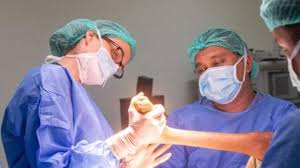
DIPLOMA IN ORTHOPAEDIC TECHNOLOGY (2 YEAR)
📘 Year 1 – Foundations & Trauma
1. Basic Sciences & Anatomy
- Applied anatomy of the musculoskeletal system: bones, joints, muscles, tendons, ligaments, nerves
- Physiology & pathology of bone/cartilage growth, fracture healing
- Biomechanics of movement and implant mechanics
2. General Orthopaedics & Trauma
- Principles of fracture management (types, classification, clinical/radiological assessment)
- Dislocations, emergency reduction techniques, wound care
- Basics of splintage, plaster, and casting techniques
3. Orthopaedic Radiology
- Interpretation of X-rays for bones, joints
- Introduction to advanced imaging: CT, MRI, bone scans
4. Bone & Joint Infections
- Acute & chronic osteomyelitis, septic arthritis
- Tuberculosis of bones & joints, emerging bone infections
5. Practical Skills
- Casting & splinting workshops
- Minor fracture management, orthopaedic ward & OT assist duties
- Regular OPD exposure and radiograph usage in clinics
6. Supportive Learning
- Health education, patient communication, general first aid
- Interdepartmental exposures: physiotherapy, anaesthesia, general surgery
📗 Year 2 – Advanced Techniques & Specialties
1. Pediatric & Developmental Orthopaedics
- Growth plate injuries, congenital deformities (e.g. DDH, clubfoot, Perthes’ disease)
2. Spine, Joint Surgery & Arthroplasty
- Spinal conditions: PIVD, scoliosis, degenerative changes
- Joint replacement basics: hip, knee, shoulder arthroplasty
3. Orthopaedic Oncology & Neurology
- Bone tumours (benign/malignant), limb salvage principles
- Peripheral nerve injuries, cerebral palsy, neuropathy issues
4. Sports & Emergency Orthopaedics
- Common sports injuries (ACL, rotator cuff, ankle sprains)
- Polytrauma, compartment syndrome, emergency protocols
5. Surgical Techniques & OT Assist
- Assisting in joint replacements, spine surgeries, pediatric procedures
- Use of C‑arm, autoclaving, biomedical OT instrument handling
6. Rehabilitation, Prosthetics & Orthotics
- Principles of physiotherapy, post‑operative rehabilitation
- Basics of prosthetic and orthotic device use
7. Advanced Practical Exposure
- Six months of clinical rotations across wards, OT, emergency, physiotherapy
- Participation in case discussions, minor procedures, and OT setups
- Hands-on exposure to arthroscopy, casting, and splinting
8. Academic & Workshop Elements
- Seminars, research presentations, skill-building workshops on arthroscopy and implant systems

